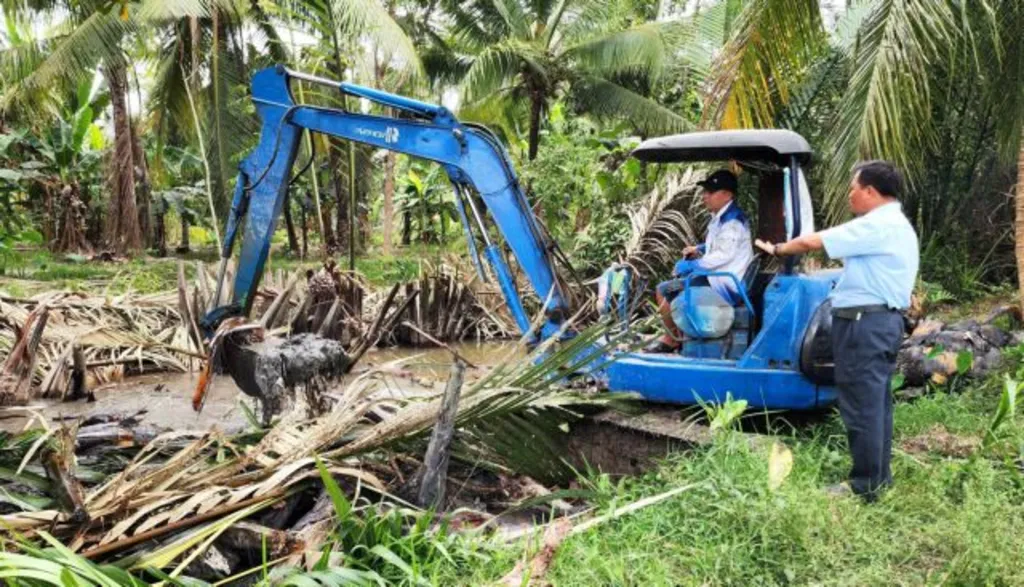 Society
Society

 |
| An irrigation canal in Trung Hiệp Commune in Vĩnh Long Province’s Vũng Liêm District is being dredged to store more water to irrigate the ongoing summer- autumn rice crop. — VNA/VNS Lê Thuý Hằng |
VĨNH LONG — Vĩnh Long Province has effectively restructured agriculture to create high-quality and value produce and improve farmers’ incomes.
The Cửu Long (Mekong) Delta province has turned to growing high-value crops such as fruits and sweet potato in demand in overseas markets on more and more unproductive rice fields to adapt to climate change and increase value in recent years.
Nguyễn Thị Diệp, a farmer in Trà Ôn District’s Hoà Bình Commune, said in her area people used to grow rice but did not make profits and even suffered losses.
“Farmers realised the area is not suitable for growing rice and switched to pineapple, and the fruit grows well in local soil conditions.”
Nguyễn Thanh Hậu of Vũng Liêm District’s Trung Hiếu Commune has switched from rice to orange, and says the profits are five to six times higher.
Lê Ngọc Yến, deputy head of the Vũng Liêm District Bureau of Agriculture and Rural Development, said: “Farmers are switching to cultivate crops and animals that have high value and quality.”
The district has instructed farmers in advanced techniques for growing key agricultural products such as durian, mango, coconut, and grapefruit and improving their quality and yields, she said.
It has also guided them in developing production codes for their farming areas and agricultural products under the national “One Commune - One Product” programme, she said.
Nguyễn Văn Liêm, deputy director of the provincial Department of Agriculture and Rural Development, said the flexibility to go back and forth between rice and other crops has helped improve value and meet market requirements.
The department would take further measures to reduce production costs, switch to suitable crops and animals and use suitable farming methods to adapt to climate change and market demand, he said.
Advanced techniques
Vĩnh Long will expand organic farming, develop circular agriculture and push for the use of advanced farming techniques using drones, efficient irrigation methods and integrated pest management.
It will increase the use of digital transformation as it plays a very important role in restructuring agriculture towards modernisation, improving value and sustainability.
Văn Hữu Huệ, deputy director of the provincial Department of Agriculture and Rural Development, said to boost the use of digital transformation in agriculture the department will advocate existing policies about research, application, transferring and expanding the use of high technology in agriculture.
It would promote the transformation of agricultural production to develop clean and high-quality agriculture, and enhance training and improving the digital skills of farmers, he said.
There are 122 crop growing areas with a total area of 2,418ha that have been granted production codes for exports, he added.
The province has 168ha of rice, 38ha of coconut and 12ha of watercress grown to organic standards.
It is expanding the use of efficient irrigation such as automatic drip and spray irrigation to save water and reduce costs.
The dry crop areas with efficient irrigation have increased from 9,600ha in 2020 to nearly 13,200ha now, or 14.4 per cent of the province’s total.
They grow mostly fruits, vegetables and sweet potato.
To encourage farmers and organisations to switch to efficient irrigation, the province offers financial support worth VNĐ40 million (US$1,600) per hectare.
It is spending VNĐ240 billion ($9.5 million) on efficient irrigation in 2021-25, and hopes to have 22,200ha of dry crop growing areas, or 25 per cent of the total, equipped with such facilities by 2025.
Meanwhile, rice farmers have switched from low- and average-quality varieties to high-quality and fragrant ones to meet the market demand.
They have also increased the use of mechanisation, and all rice growing areas are now tilled and harvested by machines and 90 per cent are tended by machines.
In the 2023-24 winter-spring crop, farmers grew 38,187ha of rice and got an average yield of seven tonnes per hectare, according to the department. — VNS




